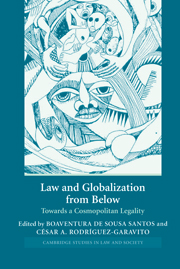Book contents
- Frontmatter
- Contents
- Notes on the contributors
- 1 Law, politics, and the subaltern in counter-hegemonic globalization
- PART ONE LAW AND THE CONSTRUCTION OF A GLOBAL ECONOMY OF SOLIDARITY
- PART TWO TRANSNATIONAL SOCIAL MOVEMENTS AND THE RECONSTRUCTION OF HUMAN RIGHTS
- PART THREE LAW AND PARTICIPATORY DEMOCRACY: BETWEEN THE LOCAL AND THE GLOBAL
- 12 Political and legal struggles over resources and democracy: experiences with gender budgeting in Tanzania
- 13 Two democracies, two legalities: participatory budgeting in Porto Alegre, Brazil
- 14 Life, life world, and life chances: vulnerability and survival in Indian constitutional law
- 15 Bottom-up environmental law and democracy in the risk society: Portuguese experiences in the European context
- Index
- References
15 - Bottom-up environmental law and democracy in the risk society: Portuguese experiences in the European context
Published online by Cambridge University Press: 07 July 2009
- Frontmatter
- Contents
- Notes on the contributors
- 1 Law, politics, and the subaltern in counter-hegemonic globalization
- PART ONE LAW AND THE CONSTRUCTION OF A GLOBAL ECONOMY OF SOLIDARITY
- PART TWO TRANSNATIONAL SOCIAL MOVEMENTS AND THE RECONSTRUCTION OF HUMAN RIGHTS
- PART THREE LAW AND PARTICIPATORY DEMOCRACY: BETWEEN THE LOCAL AND THE GLOBAL
- 12 Political and legal struggles over resources and democracy: experiences with gender budgeting in Tanzania
- 13 Two democracies, two legalities: participatory budgeting in Porto Alegre, Brazil
- 14 Life, life world, and life chances: vulnerability and survival in Indian constitutional law
- 15 Bottom-up environmental law and democracy in the risk society: Portuguese experiences in the European context
- Index
- References
Summary
INTRODUCTION
The problems faced by so-called “risk societies” (Beck 1992), including environmental problems, are best understood within the context of what Santos (2002:72–75) has called the collapse or crisis of the model of “normal” social change and, in particular, the crisis of the strategies of hegemony and trust used by the state and based on two key institutions, law and science. Responses to this crisis have bred some innovative experiences in citizen action and democratic participation.
This chapter takes up these issues through the presentation and discussion of struggles over environmental law and policies in Portugal, a semiperipheral country within a core regional space of the world-system, the European Union. Our aim is threefold: to describe and discuss the interplay of the national and the European and global scales in the making of domestic environmental regulation and legality; to characterize the tensions and conflicts arising in the attempts to enact environmental policies invoking state legality in local settings; and, finally, to examine the emergence and the dynamics of collective actors in their struggles over the environment, as they articulate scales and modes of intervention and of legality while opposing national environmental policies and hegemonic appropriations of European and international environmental regulations. A case of conflict over waste disposal and management will be examined in detail. The final section discusses the case in the light of the set of issues raised by Santos (2002) on the conditions for counter-hegemonic appropriations of law.
- Type
- Chapter
- Information
- Law and Globalization from BelowTowards a Cosmopolitan Legality, pp. 363 - 383Publisher: Cambridge University PressPrint publication year: 2005



